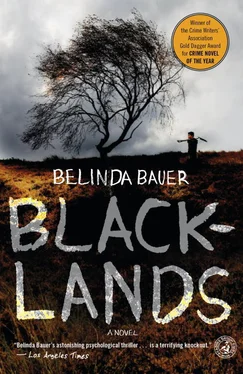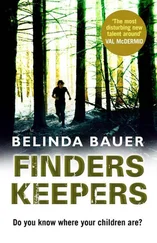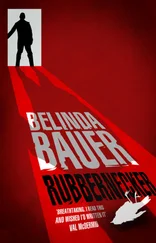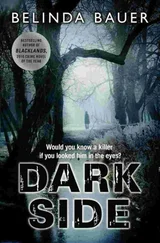Lewis’s dad had been the first to reach Steven and Arnold Avery, but Lewis’s account of what happened next was uncharacteristically sketchy. He would only say the men had dragged Avery off Steven, and then his eyes would slide away and he’d get all unsure about quite what happened next, although Steven had already heard snatched whispers of Lewis’s dad being questioned and released by the police without being charged, and of Lewis’s dad never having to buy another drink in the Red Lion.
Then Lewis’s memory would reassert itself about how Nan had seen Steven lying there with a pale green cardigan wrenched tight around his neck, and blood running from his eyes like something out of Jeepers Creepers, and how she’d first sat down and then fallen over in the purple flowers, and how the men—once they’d known Steven would be okay—had all rushed to help her. And it was in this context that Lewis allowed his father to be the hero of the hour, belying Steven’s waking vision of Lewis’s dad standing by in a blood-spattered daze while others helped.
Steven didn’t care. Lewis deserved the good half of that sandwich.
As his nan’s flaccid arms jiggled over the socks, Steven wondered where the all-terrain wheels were now. It would be nice to have them back. The police had carried them off the moor in bags—along with the smashed and bloodied trolley, his spade, the pale green cardigan, and Arnold Avery.
Unconsciously, Steven touched his throat, which was still swollen and achy and allowed him to eat ice cream and jelly by the ton. Helped by Lewis, of course.
Feeling his throat under his fingers made him shiver, even though the gas fire was on in what was proving to be a warm summer. Touching himself like that made him feel like the killer. The tender skin under his fingers, the strange dips and gristle of his own windpipe, the throb of his vein. The odd, floppy vulnerability of it all. Enough squeeze, enough press, enough cold intent, and it could all collapse and crush so easily.
Steven had thought a lot like the killer in the past two weeks. He’d thought a lot about Blacklands and a lot about Uncle Billy.
And a lot about that patch of white heather.
Avery had been sitting there, waiting for them in the white heather.
He’d forced Steven up the mound and made him kneel in the white heather.
Get down!
Steven shivered again.
“Cold?” Nan looked at him sharply.
Steven snuggled farther under the duvet she’d carried down from Uncle Billy’s bed for him, and shook his head.
Nan stood the iron on its end on the metal grille and lifted the brown paper bag.
“There,” she said.
Steven sat up and took the socks from her. They were still his old socks but they were as good as new. Better than new.
She watched as he pulled them on and wiggled his Manchester City sky-blue toes.
He looked up at her and suddenly had to bite his lip hard to keep it from getting away from him.
She saw the tears in his still-pink eyes and put a hand on his head, absolving him of the need to speak his thanks.
“Nan?”
“Mm?”
“I think…”
He grunted and started again, his voice still cracked and whispery.
“I think I know where Uncle Billy is.”
Her hand on his head twitched minutely, and Steven flinched under it in sudden fearful memory, but he didn’t pull away. He forced himself carefully back to calmness and let her hand stay there, not hurting him, warm and cozy on his head.
He could feel her thinking, as if through the very flesh that connected them.
Nan didn’t say anything for the longest time and, when she did, she smoothed his hair gently as she spoke.
“You get better,” she said. “That’s the important thing.”
BLACKLANDS WAS NEVER INTENDED TO BE A CRIME NOVEL. I thought it was going to be a very small story about a boy and his grandmother.
The spark for it came when I saw the mother of a long-murdered child on TV and started to wonder about the impact of crimes such as Avery’s, how they affect people for years, lifetimes—maybe even generations.
I thought: If I were the grandson of a woman whose son had been murdered, how would that affect me? What would my life be like? Immediately I got an overwhelming sense of the sad fragmentation of a family, which went beyond all my preconceptions of forgiveness and noble suffering. Already thinking as a twelve-year-old boy, my only question then was: How can I change this?
As Steven, writing to Avery for help seemed entirely logical. As Avery, manipulating this seeker of truth for my own gratification was a cruel pleasure. From there, the feeling that this could all spiral out of control drove Blacklands into unexpectedly dark territory.
This is a work of the imagination. My characters are not based on any real person, living or dead, and any similarity to actual persons is entirely coincidental. However, Avery’s escape over the Longmoor wall is inspired by an actual prison break which took place in 2003.
BLACKLANDS WAS WRITTEN WITH THE WELCOME HELP OF A WRITERS’ Bursary from Academi in Cardiff. Thanks to Christina Pomery for her help with prison research, and to Jack Cryer for being the hand of Steven. I am grateful to my agent, Jane Gregory, and the team at Simon & Schuster for taking a chance on a first timer. Also to Eve and Michael Williams-Jones for their generosity in instituting the Carl Foreman Award, without which I would never have been able to give up the day job and become a writer of any description. Last but not least, thank you to all my wonderful friends and family, who always had faith in me—even when I was sure they were wrong.
BELINDA BAUER has lived in England, South Africa, California, and Wales. She enjoys observing life and then reporting back.
Конец ознакомительного отрывка
Купить книгу












